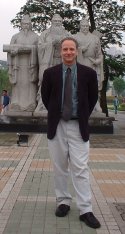International Distance Ed: The Investment Front
It caught my attention last week when
The Hartford Group, a private distance education company based in Singapore, Hong Kong and Malaysia, launched its IPO. It took some confidence on the part of Chairman K. M. Wong to go forward at this time, no matter how far back it had been planned. Singapore had not yet been declared SARS-free, the economy was tanking in many important sectors -- and Hartford decided to ask for money, at about 20 cents per share.
Wong got that much and more:
Hartford Holdings made a strong debut, jumping to 34 Singapore cents against its initial public offer price of 20 cents a share. The distance education and e-learning provider was the top traded stock, clocking volume of 25 million shares.
Economic Times, May 16, 2003
They asked for $1.2M and cashed in with about $2M.
That's not a big deal and this isn't a big story. In money terms, it's a small story. But it may be one of those indicators that major shifts are underway.
Hartford refers to itself as a
"distance education and on-line learning provider."
They indicate three delivery modes which they offer:
1)
100% Online mode: Pure e-learning, what they mean above by "on-line learning provider"
2)
Hybrid mode : "Some online and some taught mode"
3)
100% Face-to-Face taught mode : In this mode, Hartford provides local faculty to conduct traditional classroom experiences, using syllabi, readings and instructional materials provided by one of Hartford's University Partners. That is, Hartford itself is not an accredited institution. It provides essential services to accredited colleges and universities offering degree programs internationally. Hartford and companies like it are working in the trenches of transnational education. They do the marketing, registration and advising.
They provide the facilities. Hartford has Learning Resource Centers (LRCs) in Singapore, Hong Kong, Malaysia, and mainland China. Half the money Hartford raised is for establishing additional LRCs in existing markets and expansion into new markets.
This is the basic Transnational Ed equation: A local company like Hartford does the heavy lifting, and an accredited degree granting institution in Australia, the UK or a few other western countries provides content and assessment services.
Investors like this model. They bid up the IPO considerably during tough times.
I like this model. The Transnational Ed program which I direct works exactly as I described it above. My university works with a different provider --
TMC. This is a competitive marketplace.
Auston International Group put out its IPO back in April, but it didn't do as well as Hartford's.
TMC, Hartford, and Auston are vying for second place in the regional market for private education services. The leading player by far is Informatics. Hartford showed a profit of $1.6M in FY2002. During that same period, Informatics showed a profit of $21.5M.
Wong Tai, Chairman of Informatics, is the brother of Hartford Chairman K. M. Wong, (or, Wong Kock Meng). Yes, there is a sibling rivalry being played out on a world stage. They worked together at Informatics from 1993-199, at which point irreconcilable differences drove them apart. K. M. Wong immediately started The Hartford Group, and there you have it.
K. M. did pretty well on his IPO. We'll see how he does on his P&L. Transnational Ed is a lucrative business, but private companies like Hartford sometimes have to spend serious money recruiting students. Nevertheless, investors like the idea.
. . .

